
German postcard by Film-Foto-Verlag, no. G 138, 1941-1944. Photo: Star-Photo-Atelier.
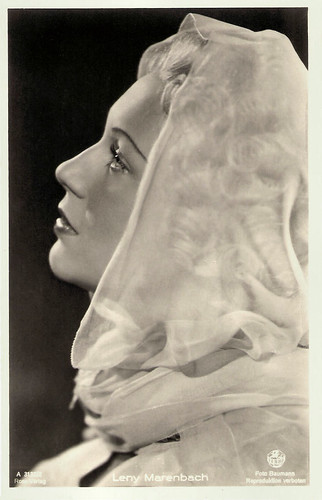
German postcard by Film-Foto-Verlag, no. A 3132/2, 1941-1944. Photo: Baumann / Terra.
A dream couple of the German cinema
Leni Marenbach was born in Essen in the German Empire in 1907. At the age of 16, she had her debut at the Schauspielhaus Essen, where she played Clara in Goethe’s 'Egmont' and Luise in Schiller’s 'Kabale und Liebe'. She then spent three years at the Schauspielhaus Zurich, followed by engagements in Darmstadt, at the Theater in der Josefstadt in Vienna and at the Kammerspiele in Munich.
In 1935, she made her film debut in Prague as Jana in the German-language film Jana, das Mädchen aus dem Böhmerwald/Jana, the Girl from the Bohemian Forest (Robert Land, 1935). The following year, she played Heinz Rühmann’s wife in the comedy Wenn wir alle Engel wären/If We All Were Angels (Carl Froelich, 1936). Rühmann was Germany's number one box-office star in these years. The film was her breakthrough, and for a time, she and Rühmann were a dream couple of the German cinema. Also, privately, they were a couple.
She played the female lead in the adventure film Alarm in Peking (Herbert Selpin, 1937) opposite Gustav Fröhlich and Peter Voß. This propaganda film is set against the backdrop of the 1900 Boxer Rebellion in China. German filmmakers had frequently used China as a setting since the 1910s, but from 1931 onwards, they made a series of films with political overtones. After the war, the film was forbidden.
A huge success was the comedy Der Mustergatte/The Model Husband (Wolfgang Liebeneiner, 1937), in which she co-starred with Heinz Rühmann and Hans Söhnker. The comedy was screened at the Venice Film Festival, where it won an award, and in the 1950s it was remade twice.
Marenbach and Rühmann were again a couple in the comedy Fünf Millionen suchen einen Erben/Five Million Look for an Heir (Carl Boese, 1938). Her next film, Ziel in den Wolken/Target in the Clouds (Wolfgang Liebeneiner, 1939) is a drama featuring Albert Matterstock as the German aviation pioneer Walter von Suhr, an officer in the pre-First World War German army who saw the potential for military aircraft.
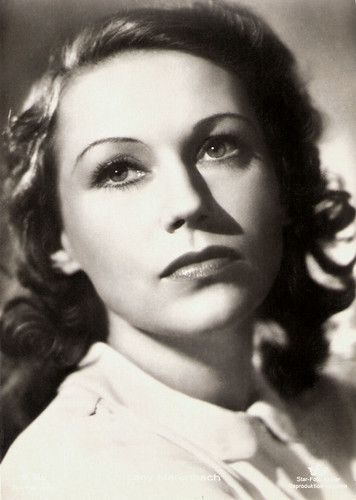
German postcard by Film-Foto-Verlag, no. G 186, 1941-1944. Photo: Star-Photo-Atelier / Tobis.
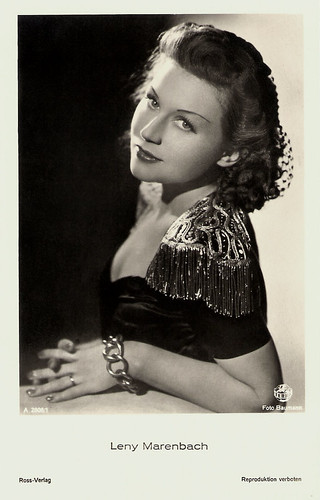
German postcard by Ross-Verlag, no. A 2808/1, 1939-1940. Photo: Baumann / Terra.
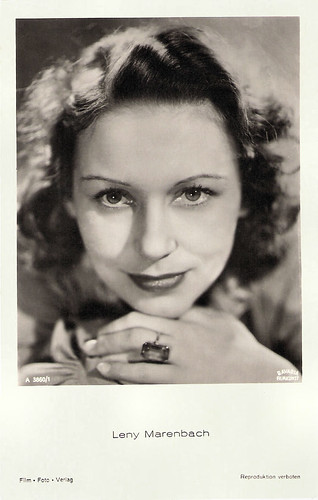
German postcard by Film-Foto-Verlag, no. A 3860/1, 1941-1944. Photo: Bavaria Filmkunst.
Sympathetic naturalness
Leny Marenbach was loved by the German public for her sympathetic naturalness. I.S. Mowis describes her at IMDb as ‘Germany's answer to Irene Dunne’: “She seemed to have little artifice about her and was therefore ideally suited to play gentle, impeccably well-mannered model wives or brave battlers against the forces of adversity. In a more emancipated mode, she added a much-needed sparkle to assorted mainstream melodramas and could also occasionally display a deft talent for comedy.” Leny showcased her versatility as a dramatic actress in her dual role in Frau nach Maß/Woman-to-measure (Helmut Käutner, 1940) opposite Hans Söhnker. The film was written under a pseudonym by Erich Kästner.
During the war years, she got star billing even if she played only a supporting part, such as in Friedemann Bach (Traugott Müller, Gustaf Gründgens, 1941). This biopic depicts the life of Johann Sebastian Bach's gifted son, Wilhelm Friedemann Bach (Gustav Gründgens), who tries to escape his father's shadow. In Ein Zug fährt ab/A train leaves (Johannes Guter,1942), her co-star was Ferdinand Marian. In the comedy Die Wirtin zum Weißen Rößl/The landlady of the White Horse Inn (Karl Anton, 1943), she appeared opposite Karl Schönböck, and in the comedy Wildvogel/Wild-Bird (Johannes Meyer, 1943) with Volker von Collande.
In 1944, she appeared with Carl Raddatz and Hansi Knoteck in the Heimatfilm Das war mein Leben/That was my life (Paul Martin, 1944). The family comedy Wie sagen wir es unseren Kindern?/How do we say so to our children? (Hans Deppe, 1945), starring Mathias Wieman, only reached the cinemas after the war, in 1949. After World War II, Marenbach’s popularity declined. In 1949, she appeared with Willy Fritsch in the musical comedy Hallo – Sie haben Ihre Frau vergessen/Hello – You have forgotten your wife (Kurt E. Walter, 1949).
In 1952, she received a contract from the DEFA (Deutsche Film-Aktiengesellschaft), the state-owned film studio in the German Democratic Republic (East Germany). Among her East-German films are the Spy thriller Geheimakten Solvay/Secret Files of Solvay (Martin Hellberg, 1953) and the comedy Wer seine Frau lieb hat/Who loves his wife (Kurt Jung-Alsen,1955) with Albert Garbe. Geheimakten Solvay aroused criticism in the West for its blatant propagandist content. Because of her East German work, she was not offered film roles in West Germany.
Marenbach played theatre in Berlin. On West-German TV, she could be seen in a few series like Am grünen Strand der Spree/On the green beach of the river Spree (Fritz Umgelter, 1960). At the end of the 1960s, she retired from show business. She was briefly married with the cameraman Walter Pindter and had a son with him. Leny Marenbach died of heart failure in West Berlin, West Germany, in 1984.

German postcard, no. A 3643/1, 1941-1944. Photo: Bavaria Filmkunst.
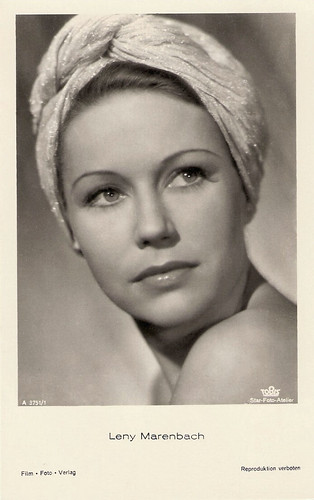
German postcard by Film-Foto-Verlag, no. A 3751/1, 1941-1944. Photo: Tobis / Star-Foto-Atelier.
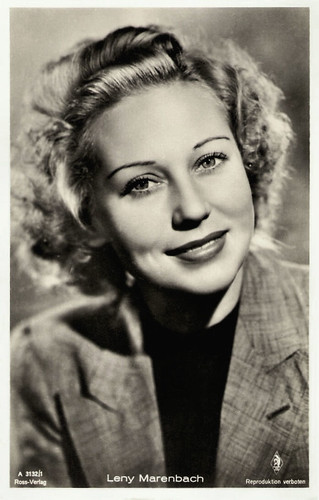
German postcard by Ross Verlag, no. A 3132/1, 1941-1944.
Sources: Stephanie D’heil (Steffi-line – German), Thomas Staedeli (Cyranos), Film-Zeit.de (German - Now defunct), Defa-stiftung (German - Page now defunct), Wikipedia (German and English) and IMDb.
This post was last updated on 7 May 2025.
No comments:
Post a Comment